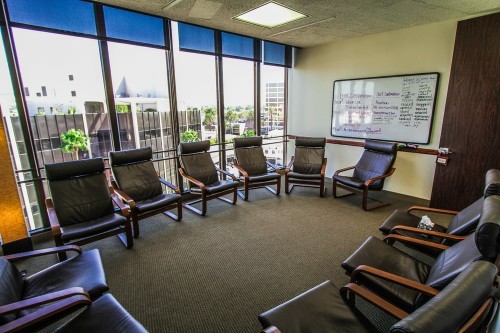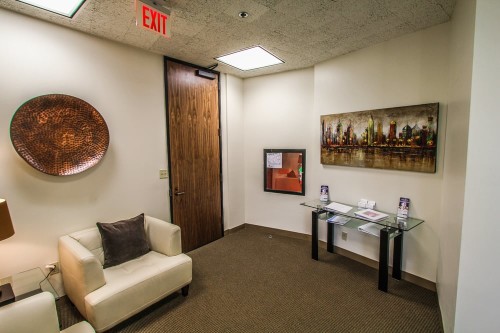






Center for Discovery Beverly Hills
Treatment Focus
You can get treatment for eating disorders at this center, helping you navigate symptoms, build coping tools, and restore your physical health under expert care.
Primary Level of Care
Outpatient treatment offers flexible therapeutic and medical care without the need to stay overnight in a hospital or inpatient facility. Some centers offer intensive outpatient program (IOP), which falls between inpatient care and traditional outpatient service.
Claimed
Recovery.com has connected directly with this treatment provider to validate the information in their profile.
Treatment Focus
You can get treatment for eating disorders at this center, helping you navigate symptoms, build coping tools, and restore your physical health under expert care.
Primary Level of Care
Outpatient treatment offers flexible therapeutic and medical care without the need to stay overnight in a hospital or inpatient facility. Some centers offer intensive outpatient program (IOP), which falls between inpatient care and traditional outpatient service.
Provider's Policy
Center for Discovery is a preferred provider with most major insurance companies.
Center for Discovery Beverly Hills
Center for Discovery Beverly Hills
About Center for Discovery Beverly Hills
Center for Discovery Beverly Hills provides outpatient eating disorder treatment for adolescents (age 10+) and adults of all genders. Located in the heart of Beverly Hills, with views of the Hollywood Hills, this facility opened in July 2014 and offers partial hospitalization (PHP), intensive outpatient (IOP), and virtual program options. Treatment methods include eye movement desensitization and reprocessing (EMDR) therapy, motivational interviewing, trauma-informed care, cognitive behavioral therapy (CBT), and dialectical behavior therapy (DBT). In addition to receiving evidence-based therapies, clients have the opportunity to rediscover joyful movement through yoga and other physical activities. Discovery’s specialized binge eating disorder (BED) program, Path to Peace, is also offered at this location.
Path to Peace: Inclusive Binge Eating Care
Center for Discovery believes in establishing “connection over correction.” Their inclusive community spaces foster safety and vulnerability for patients who struggle with bingeing and chronic dieting. The Path to Peace program is designed to honor the unique nuances of bingeing and the deceptiveness of diet culture. The trauma-attuned program’s core tenets include representation and belonging, shame resilience, and weight-neutral care.
Partial Hospitalization Program (PHP)
PHP falls on the continuum of mental healthcare between residential and outpatient treatment. Center for Discovery offers both adolescent and adult PHP options. The treatment team includes dietitians, psychiatrists, and counselors. The program involves individual, family and group counseling, as well as medication management, nutritional counseling and meal supervision. PHP meets 5-6 days a week, but participants go home each day to the comfort of their own beds. This allows clients to receive much of the same structure as residential care during the day, with the opportunity to begin practicing new skills as they transition to life outside the treatment program.
Patients will eat and be provided one or two meals/snacks at the facility for hands-on support and some meals/snacks will be eaten at home. This provides patients with the space to practice and implement the skills learned while in the program. Center for Discovery provides free in-person eating disorder support groups every Thursday evening, as well as free online support groups.
Intensive Outpatient Program (IOP)
IOP treatment is a lower level of care that does not require hospitalization, around the clock monitoring, or overnight stays, and is usually part of a step-down approach from residential or PHP treatment. IOP requires individuals to obtain at least 9 hours of group and/or individual therapy per week, which is divided up into 3-hour sessions 3 to 5 evenings a week, or on weekends, for 12-16 weeks. The goal of IOP is to allow clients to shift the majority of their time and focus back to life outside of treatment, using IOP to continue the work on those areas where they need additional therapy or skills practice. In IOP, meals are eaten outside of the program.
Virtual Program
The virtual online eating disorder treatment program was intentionally created to meet the needs of patients from the comfort of their own home. Patients have different reasons for not being able to attend therapy in-person, and Center for Discovery believes everyone should have the opportunity to get the quality care that literally meets them where they are.
Center for Discovery is in-network with all major insurance companies and provides complimentary benefit verification.
Center Overview
Treatment Focus
You can get treatment for eating disorders at this center, helping you navigate symptoms, build coping tools, and restore your physical health under expert care.
Joint Commission Accredited
The Joint Commission accreditation is a voluntary, objective process that evaluates and accredits healthcare organizations (like treatment centers) based on performance standards designed to improve quality and safety for patients. To be accredited means the treatment center has been found to meet the Commission's standards for quality and safety in patient care.
Insurance Accepted
Cash Pay Rates
Estimated Cash Pay Rate
Center pricing can vary based on program and length of stay. Contact the center for more information. Recovery.com strives for price transparency so you can make an informed decision.
Levels of Care






Your Care Options
Specializations
Eating Disorders
An eating disorder is a long-term pattern of unhealthy behavior relating to food. Most people with eating disorders have a distorted self-image.
Who We Treat
Adolescents
Teens receive the treatment they need for mental health disorders and addiction, with the added support of educational and vocational services.
Men and Women
Men and women attend treatment for addiction in a co-ed setting, going to therapy groups together to share experiences, struggles, and successes.
Approaches
Evidence-Based
A combination of scientifically rooted therapies and treatments make up evidence-based care, defined by their measured and proven results.
Experiential
Expressive tools and therapies help patients process past situations, learn more about themselves, and find healing through action.
Individual Treatment
Individual care meets the needs of each patient, using personalized treatment to provide them the most relevant care and greatest chance of success.
Wellness
Wellness philosophies focus on the physical, mental, and spiritual wellness of each patient, helping them restore purpose with natural remedies.
Therapies
Eye Movement Therapy (EMDR)
Lateral, guided eye movements help reduce the emotional reactions of retelling and reprocessing trauma, allowing intense feelings to dissipate.
Motivational Interviewing
Based on the idea that motivation to change comes from within, providers use a conversational framework to discover personalized methods for change.
Yoga
Yoga is both a physical and spiritual practice. It includes a flow of movement, breathing techniques, and meditation.
Conditions We Treat
Eating Disorders
An eating disorder is a long-term pattern of unhealthy behavior relating to food. Most people with eating disorders have a distorted self-image.
Substances We Treat
Co-Occurring Disorders
A person with multiple mental health diagnoses, such as addiction and depression, has co-occurring disorders also called dual diagnosis.
Languages
Care Designed for Your Needs
Activities
Yoga
Yoga is both a physical and spiritual practice. It includes a flow of movement, breathing techniques, and meditation.
What people are saying
Treatment
5.0
Accommodations
5.0
Food & Nutrition
5.0
Value
5.0
AR
Treatment in 2025 • (45 days) • Reviewed 02/13/25
Former Client
•Inglewood, CA





